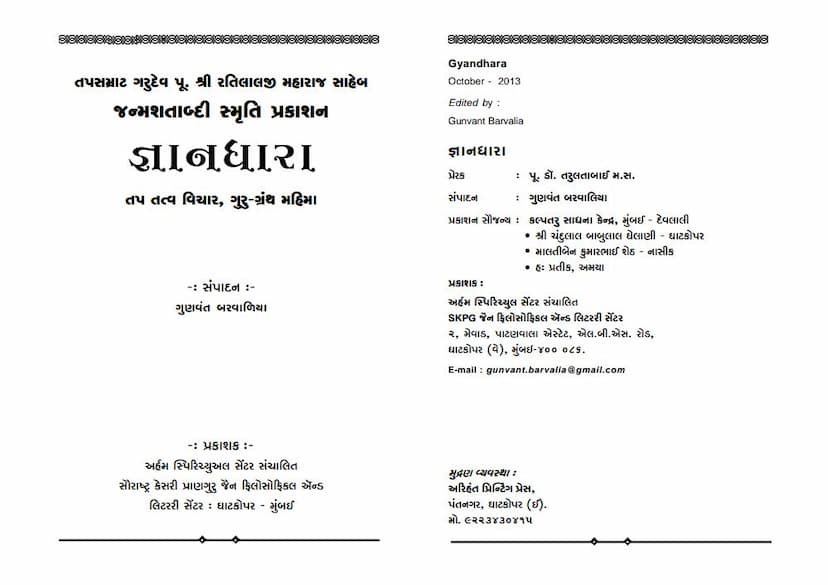Gyandhara Tap Tattva Vichar Guru Granth Mahima
Added to library: September 1, 2025

Summary
This comprehensive summary covers the Jain text "Gyandhara Tap Tattva Vichar Guru Granth Mahima" by Gunvant Barvalia, published by Arham Spiritual Centre. The book is a collection of essays presented at Jain Sahitya Gnyan Satra (Jain Literature Knowledge Session) events, focusing on the principles of Tapas (asceticism) and the glory of scriptures and gurus.
The text is structured around the following key themes:
1. Honoring Guru Parampara and Spiritual Leaders:
- A significant portion of the book is dedicated to commemorating the birth centenary of Tap Samrat Guru Dev Poojya Shri Ratilalji Maharaj Saheb.
- Several articles pay tribute to him and his disciples, including:
- Poo. Dr. Jashubai Mahasatiji, a beloved disciple of Saurashtra Kesari Prangurudev.
- Poo. Dr. Tarultaji Mahasatiji, a disciple of Poo. Bapji.
- Poo. Jayantmuniji, a unique ascetic and philosopher.
- Rashtrasant Poo. Gurudev Shri Namramuniji Maharaj Saheb, highlighting his spiritual journey.
- The text also touches upon the role of gurus like Saurashtra Kesari Pranguru and Kanji Maheswari in activating dharma and spirituality in daily life.
2. Deep Dive into the Principles of Tapas (Asceticism):
- The book extensively explores the concept of Tapas as a cornerstone of Jainism, essential for spiritual purification and liberation.
- It details various types of Tapas, categorized into external (Bahya) and internal (Abhyantar) Tapas.
- Six External Tapas:
- Anashan (fasting)
- Unodari (eating less than hunger, moderate eating)
- Vrutti Samkshep (restricting vows and conduct)
- Ras Tyag (abstaining from delicacies and tastes)
- Kay Klesh (enduring physical hardship and discomfort)
- Pratisallinata (controlling senses and mind)
- Six Internal Tapas:
- Prayashchitta (repentance and atonement)
- Vinay (humility and respect)
- Vaiyaavachchhya (service and care for the needy, especially ascetics)
- Swadhyaya (self-study and scriptural study)
- Dhyana (meditation)
- Kayotsarg (equanimity and detachment from the body)
- Six External Tapas:
- The scientific basis and benefits of various practices like Unodari, Maun Sadhana (silence), Aayambil, Upavas (fasting), Biyasana (two meals a day), and Ekasana (one meal a day) are discussed, linking them to health and spiritual well-being.
- The importance of Vaiyaavachchhya as a heartfelt service and the nuances of Pratikraman (confession of sins) as an internal purification ritual are highlighted.
- The text emphasizes that Tapas should be performed with the sole intention of nirjara (shedding karmas) and not for worldly gains or fame.
3. The Significance of Scriptures and Knowledge (Guru Granth Mahima):
- The book underscores the vital role of scriptures (Granth) in guiding individuals towards spiritual growth and righteousness.
- It emphasizes that scriptures, along with gurus, are crucial factors in activating dharma and spirituality in daily life.
- The need for the global dissemination of Jain philosophy and principles is discussed, highlighting the necessity of understanding and practicing these ancient teachings in the modern world.
- The importance of Swadhyaya (self-study) and the systematic study of Jain Agamas is emphasized as a means of self-realization.
4. Inspirational Life Stories and Examples:
- The book includes biographical sketches and anecdotes of prominent Jain ascetics and figures, such as:
- The early life and spiritual awakening of Ratilalji Maharaj Saheb, who later became known as Tap Samrat.
- The profound influence of Tapswi Manekchandji M.S. on young Ratilal.
- The dedication of disciples like Janakbhai and others who followed the path of sanyam (asceticism).
- The exemplary lives of Shripal and Mayana in their tapasya.
- The life of Arjun Mali, a notorious dacoit transformed into an ascetic through the teachings of Bhagwan Mahavir.
- The scientific perspective on Jain practices like Brahmacharya and Maun (silence).
- The text often uses stories and analogies to illustrate the principles of Jain philosophy, making them relatable and impactful.
5. Call for Universal Dissemination and Practical Application:
- The book advocates for the active propagation of Jain teachings worldwide, suggesting methods like translation, online education, and utilizing modern media.
- It stresses the importance of integrating Jain principles like Ahimsa (non-violence), Aparigraha (non-possession), and Anekantavada (non-absolutism) into daily life for societal harmony and individual transformation.
- The need for consistent self-reflection (introspection), adherence to ethical conduct (conduct), and the guidance of a true guru are highlighted as essential for spiritual progress.
Publisher and Editorial Information:
- Publisher: Arham Spiritual Centre.
- Edited by: Gunvant Barvalia.
- Inspiration: Poo. Dr. Tarultabai M.S.
- Support: Kalptaru Sadhana Kendra, Mumbai - Devalali, and other patrons.
In essence, "Gyandhara Tap Tattva Vichar Guru Granth Mahima" serves as a profound exploration of Jain spiritual practices, emphasizing the transformative power of Tapas, the wisdom of scriptures, and the indispensable role of gurus in guiding individuals toward self-realization and liberation. It aims to inspire readers to embrace these principles in their lives for personal and societal betterment.